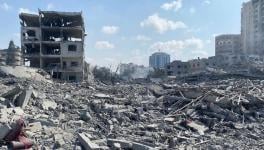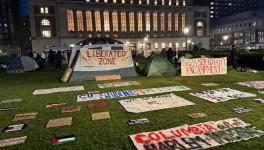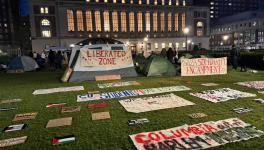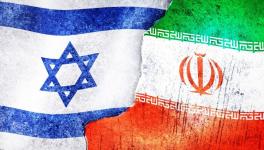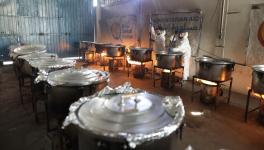Starvation is a War Crime: Notes From Israeli Genocide Against Palestinians
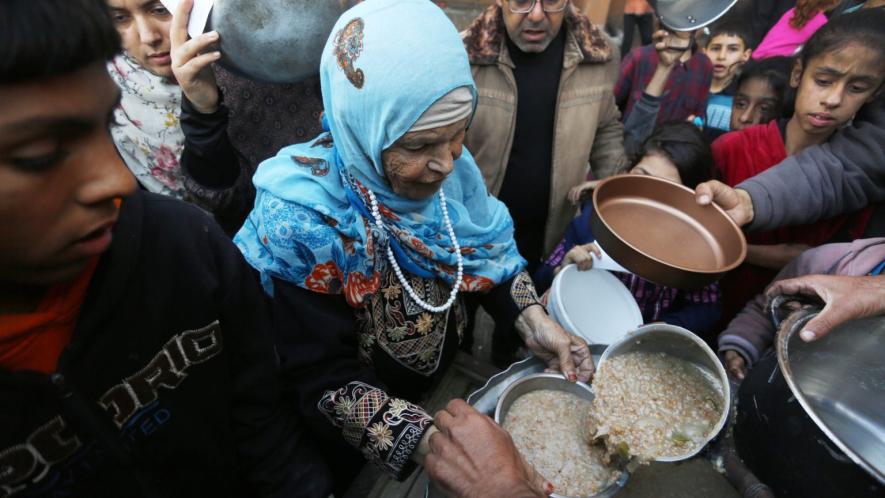
Photo: UNRWA partners/X
Speaking in Rome, Italy, the head of the United Nations World Food Programme, Cindy McCain, said: “If we do not exponentially increase the size of aid going into the northern areas” of Gaza, “famine is imminent. It’s imminent.”
Over 30,000 Palestinians have been killed in Gaza by the genocidal Israeli war, and the Palestinians in Gaza are on the verge of famine. Palestine’s Permanent Observer at the United Nations Riyad Mansour said that over half a million people are “one step away from famine.” “What it means for mothers and fathers to hear their babies and children cry of hunger day and night, no milk, no bread, nothing,” he added.
Indeed, babies and children already have begun to die due to the famine-like conditions in Gaza. With Ramadan already begun, the situation is not only physically acute, but also mentally torturous.
There are currently 2,000 medical workers who are trying their best to operate basic medical care in northern Gaza. They are working without access to any hospital facilities and often with no power or water, including very limited supplies of medicines. Now, the Palestinian Ministry of Health in Gaza has said that these workers are themselves in a dire situation.
The staff, said the Ministry, “will start Ramadan without Suhoor or Iftar meals.” “Doctors will die. The nurses there will die. And the world will witness the largest number of victims of hunger in the coming days,” said Ashraf al-Qudra, the ministry’s spokesperson.
War Crime
In June 1977, at a conference on humanitarian law in armed conflict, the member states of the United Nations extended the Geneva Conventions (1949) to add Protocol II. Article 14 of that protocol says that “[s]tarvation of civilians as a method of combat is prohibited.” The belligerent power is “prohibited to attack, destroy, remove, or render useless” any “objects indispensable to the survival of the civilian population, such as foodstuffs, agricultural areas for the production of foodstuffs, crops, livestock, drinking water installations and supplies and irrigation works.”
Two decades later, when the UN member states wrote up the Rome Statute (1998), they added in a section on starvation under the heading of war crimes (Article 8); “intentionally using starvation of civilians as a method of warfare by depriving them of objects indispensable to their survival, including wilfully impeding relief supplies” is a war crime. The Rome Statute is the treaty that formed the International Criminal Court (ICC), which has thus far remained silent on its obligations to act on its own founding document.
On February 29, trucks with humanitarian aid came into the northern part of Gaza. When desperate people rushed to these trucks, Israeli soldiers fired on them and killed at least 118 unarmed civilians. This is now known as the Flour Massacre. In its aftermath, 10 UN experts released a strong statement, which noted, “Israel has been intentionally starving the Palestinian people in Gaza since October 8. Now it is targeting civilians seeking humanitarian aid and humanitarian convoys.”
The UN special rapporteur for food, Michael Fakhri, who signed that statement, later expanded this accusation against Israel. “Israel,” he told the UN Human Rights Council, “has mounted a starvation campaign against the Palestinian people in Gaza.” These statements are very pointed. Words such as “intentionally” and phrases such as “starvation campaign” directly accuse Israel of war crimes based on Protocol II and the Rome Statute.
Fakhri focused on Gaza’s fishing industry, which had provided important food security for the 2.3 million Palestinians who live there. “Israeli forces,” he said, have “decimated the Port of Gaza, destroying every single fishing boat and shack. In Rafah, only two out of 40 boats are left. In Khan Younis, Israel destroyed approximately 75 small-scale fishing vessels.” This destruction, Fakhri said, has pushed Gaza “into hunger and starvation.” “In fact,” he added, “Israel has been strangling Gaza for 17 years through a blockade, which included denying and restricting small-scale fishers access to their territorial waters.”
At the UN General Assembly, Palestine’s Riyad Mansour said that Israel has bombed “every bakery and farm, destroying livestock and all means of food production.”
In the first month of the bombardment, Israel bombed the major bakeries of Gaza City. In November 2023, Abdelnasser al-Jarmi of the Bakery Owners Association in the Gaza Strip said that bakeries have not been able to function for lack of fuel and flour. As a consequence of the absence of bread, families have begun to gather a weed called khubaiza (or Malva parviflora) and to boil this as the main meal. “We are dying for a piece of bread,” said Fatima Shaheen as she built a meal for her two sons and their children in northern Gaza.
Crossings
Israel has refused to fully open the crossings into Gaza at Beit Hanoun and Karem Abu Salem as well as refused to allow complete opening of the Rafah crossing the links Gaza to Egypt. Since these land crossings are closed, and since Israel destroyed the Yasser Arafat International Airport in 2001, there are no easy solutions to bring food aid into Gaza. Delivery of food and supplies through the air is not sufficient—indeed it is a drop in the ocean (which is where some of the aid packages landed).
There is now talk of building maritime corridors, but since Israel has bombed the Port of Gaza this is not an easy option. That the US has said that it would build a temporary pier off the coast of Gaza’s southern half is ridiculous. It would be so much easier to open the Rafah crossing to allow at least 500 trucks a day into Gaza. But Israel will not permit this option.
International law is clear as daylight on the point of starvation as a war crime. There are no loopholes in Protocol II (1977) or in the Rome Statute (1998).
Friends in Gaza are finding this Ramadan month to be more difficult than any previously. Starvation is their general condition. But, unlike with other Ramadans, there is no early morning meal (Suhoor) and no late-night meal (Iftar). There is only the perennial noise of Israeli fighter jets mirrored by the groans of hunger in their bellies.
Vijay Prashad is an Indian historian, editor, and journalist. He is a writing fellow and chief correspondent at Globetrotter. He is an editor of LeftWord Books and the director of Tricontinental: Institute for Social Research.
Source: This article was produced by Globetrotter.
Get the latest reports & analysis with people's perspective on Protests, movements & deep analytical videos, discussions of the current affairs in your Telegram app. Subscribe to NewsClick's Telegram channel & get Real-Time updates on stories, as they get published on our website.









